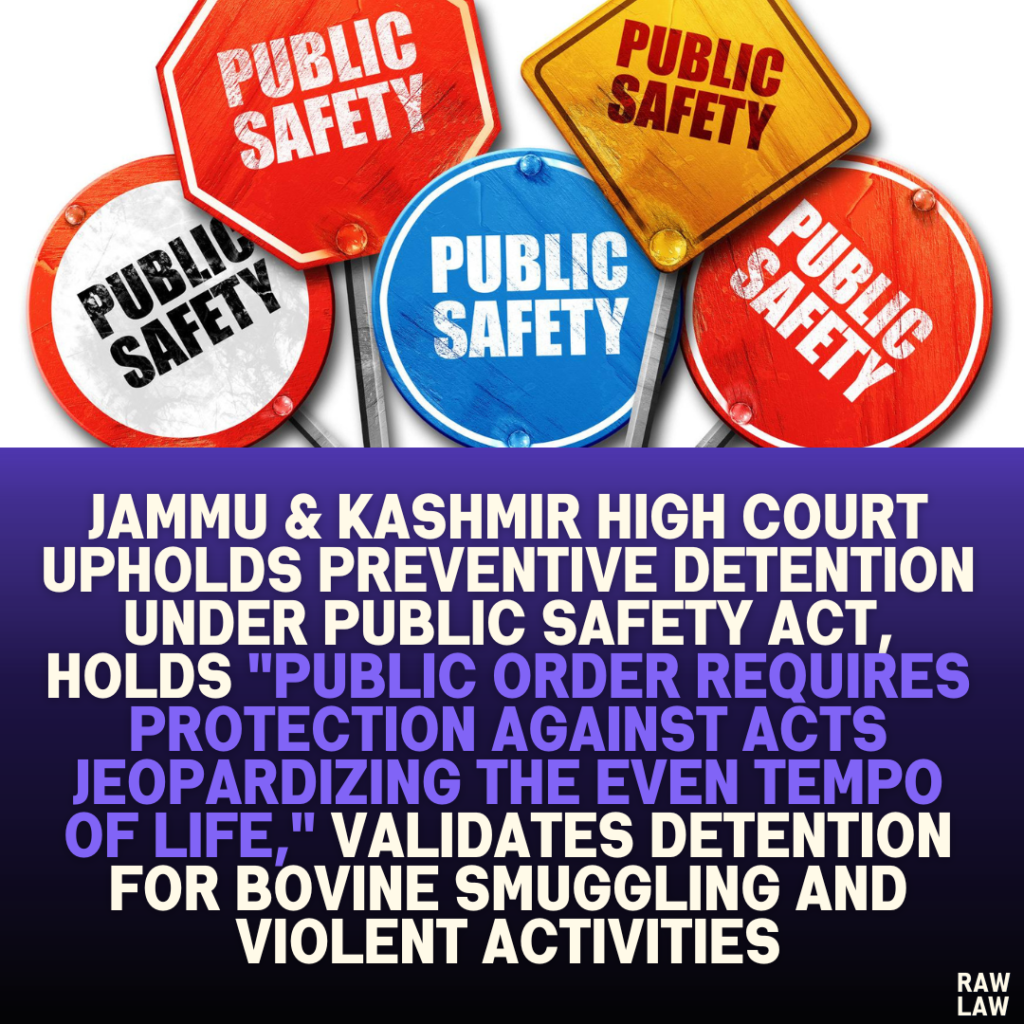Court’s Decision
The Jammu & Kashmir High Court upheld the preventive detention of the petitioner under the Jammu & Kashmir Public Safety Act, 1978, dismissing the plea that sought the quashing of the detention order. The court emphasized that the petitioner’s repeated involvement in criminal activities, including bovine smuggling, justified his detention to maintain public order. The court held that procedural safeguards were adhered to and that the petition lacked merit.
Facts
- Background of Detention:
- The petitioner was detained under Order No. PSA 12 of 2024 dated March 16, 2024, issued by the District Magistrate, Jammu, under Section 8(1)(a) of the Public Safety Act, 1978.
- The petitioner’s detention was linked to his involvement in multiple criminal cases, including:
- Smuggling bovine animals in violation of permits.
- Violent incidents where the petitioner allegedly attacked individuals, tore women’s clothes, and outraged their modesty.
- FIRs Against the Petitioner:
- Several FIRs were registered at different police stations, including Ghagwal, Nagrota, and Satwari.
- Despite being granted bail in all cases, the petitioner continued engaging in criminal activities, as noted in the detention dossier.
- Petition’s Allegations:
- The petitioner contended that his detention was illegal, arbitrary, and unnecessary as the criminal justice system was capable of handling his alleged misconduct.
- He argued procedural violations, including the non-supply of material in a comprehensible language and denial of the opportunity for effective representation.
Issues
- Whether preventive detention under the Public Safety Act was justified in the petitioner’s case.
- Whether procedural safeguards, such as the right to representation and the supply of necessary documents, were violated.
Petitioner’s Arguments
- Non-Application of Mind:
- The detention order was a verbatim copy of the dossier, reflecting no independent assessment by the detaining authority.
- Lack of Necessary Documents:
- The petitioner claimed that he was not supplied with crucial documents such as the FIRs and statements of witnesses, infringing on his constitutional right to make an effective representation under Article 22(5) of the Constitution.
- Language Barrier:
- The detention order and supporting documents were in English, a language the petitioner did not understand, violating the procedural requirement that detainees be informed in a language they comprehend.
- Alternative Legal Remedies:
- The petitioner argued that his alleged activities could have been dealt with under regular criminal laws, making preventive detention unnecessary.
- Violation of Procedural Safeguards:
- The petitioner alleged that the detention order was not approved by the Advisory Board within the stipulated time, rendering it invalid.
Respondent’s Arguments
- Habitual Offender:
- The state argued that the petitioner was a habitual offender whose repeated involvement in criminal activities posed a threat to public order.
- His actions included bovine smuggling, which had communal repercussions, and violent behavior that terrorized the local community.
- Public Order vs. Law and Order:
- The respondents stressed that the petitioner’s activities disturbed the even tempo of community life, warranting preventive detention.
- Compliance with Procedural Safeguards:
- The detention order and supporting documents were served in Hindi/Dogri, languages understood by the petitioner.
- The petitioner was informed of his right to make a representation to the detaining authority and the government.
Analysis of the Law
The court analyzed the distinction between “law and order” and “public order” as outlined in several Supreme Court judgments:
- Arun Ghosh v. State of West Bengal (1970):
- Public order concerns disturbances that disrupt community life, unlike law and order breaches that affect only individuals.
- Commissioner of Police v. Anita (2004):
- Acts affecting the broader community and disrupting public tranquility fall under public order, necessitating preventive detention.
- R. Kalavathi v. State of Tamil Nadu (2006):
- Even a single act with the propensity to disturb public tranquility can justify preventive detention.
The court noted that the petitioner’s actions, particularly bovine smuggling, had communal implications, creating discontent and potentially inciting communal disharmony.
Precedent Analysis
The court relied on precedents distinguishing public order from law and order:
- Pushkar Mukherjee v. State of West Bengal (1970): Defined public crimes as those affecting society at large.
- Babul Mitra v. State of West Bengal (1973): Clarified that the potential impact of an act determines its categorization as a public order issue.
These cases supported the view that preventive detention was warranted given the petitioner’s actions.
Court’s Reasoning
- Nature of the Petitioner’s Activities:
- The petitioner’s continued engagement in bovine smuggling and violent acts had the potential to disrupt public tranquility and communal harmony.
- The court noted that such acts extended beyond individual impacts and posed a threat to public order.
- Adherence to Procedural Safeguards:
- The petitioner was provided all necessary documents in a language he understood.
- He was informed of his right to representation but chose not to exercise it.
- Necessity of Preventive Detention:
- Despite being granted bail in prior cases, the petitioner resumed criminal activities, justifying the need for preventive detention to prevent further disruptions.
Conclusion
The court dismissed the petition, holding that:
- The detention order was valid and justified.
- Procedural safeguards were observed.
- Preventive detention was necessary to preserve public order.
Implications
This judgment reaffirms the judiciary’s stance that preventive detention is a crucial tool to address threats to public order. It underscores the balance between protecting individual rights and ensuring community safety, particularly in cases involving communal harmony. The court’s reliance on established precedents also strengthens the legal framework for distinguishing between public order and law and order concerns.
